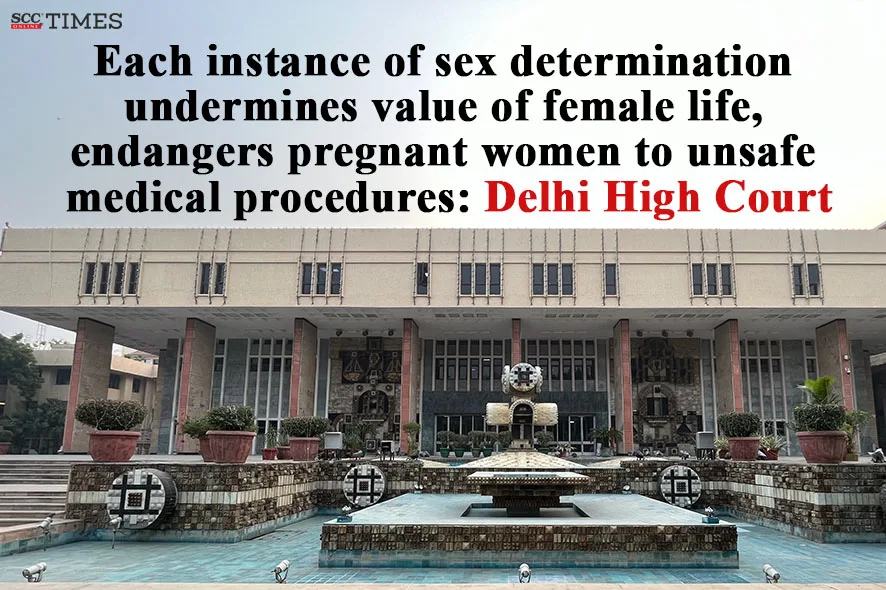Delhi High Court: The present application was filed by the petitioner-accused seeking grant of anticipatory bail in FIR under Sections 85, 316(2), 89 and 3(5) of Bharatiya Nyaya Sanhita, 2023 (‘BNS’) in which it was alleged that he was a part of an organized scheme facilitating illegal sex determination in violation of the Pre-Conception and Pre-Natal Diagnostic Techniques Act, 1994 (‘PNDT Act’). A Single Judge Bench of Swarana Kant Sharma, J., held that the practice of determining the sex of a fetus and taking subsequent actions based on that information was not merely a violation of law, but each instance of such nature undermined the value of female life and signaled that some lives were deemed less worthy than others due to their gender.
Accordingly, the Court denied anticipatory bail to the accused and stated that his custodial interrogation was necessary at this stage, which was required not only for serving justice in the case at hand but also to determine whether he had connections with any hospital where illegal abortions were being conducted.
Background
In the present case, the deceased was married to the accused’s son and had daughters, one of whom was physically challenged. The complainant, her father, had consistently alleged that his daughter had been subjected to continuous dowry harassment and mental cruelty by her husband and his family members. During her third pregnancy, the husband had disclosed the gender of the unborn child, i.e., a girl child to the complainant, based on an illegal ultrasound allegedly conducted by the accused along with his son. Thereafter, the deceased was coerced into undergoing an abortion, during which she suffered complications and ultimately died.
The husband of the deceased had been arrested, was remanded to two days of police custody, and was subsequently sent to judicial custody. During investigation, a close associate of the accused had disclosed that the illegal ultrasound had been conducted by him and his son.
The accused contended that his involvement was only alleged on the basis of statements made by third parties and that no independent evidence directly linked him to the commission of the offence. Per contra, the respondent submitted that another FIR was lodged against the accused and an FIR was registered against his son under the PNDT Act which indicated that the accused’s family operated in an organized manner.
Analysis and Decision
Considering the status report, the Court noted that the accused and his son were actively working in tandem to carry out illegal ultrasounds, with the specific objective of determining the sex of the fetus, thereby facilitating a practice that was not only unlawful but also highly detrimental to societal interests.
Further, the Court noted that the son of the accused was impersonating as a doctor, as evident by photographs and other material collected during the investigation, and was a co-accused in the present case, with specific allegations that he actively conducted the illegal ultrasound of the deceased for the purpose of determining the sex of the fetus. The Court highlighted that both the accused persons were motor mechanics by profession, who, in addition to their regular occupation, had been running a side business of conducting illegal ultrasounds of pregnant women with the sole objective of determining the sex of the unborn child.
The Court opined that, “The practice of determining the sex of a fetus and taking subsequent actions based on that information is not merely a violation of law, but each instance of such nature undermines at the value of female life and signals that some lives are deemed less worthy than others due to their gender. It fosters a culture in which girls are seen as burdens rather than equal members of the community and endangers pregnant women by exposing them to unsafe medical procedures. Beyond the immediate family, such acts corrode social conscience, and strike at the hope of a society to be free from discrimination.”.
The Court observed that if such practices were allowed to continue, it would send a message that human life had little value, and it was therefore necessary that the law intervened decisively to send a clear message that every life, regardless of gender, was entitled to protection and dignity. Therefore, the Court held that the recovery of instruments used in the offence, custodial interrogation of the accused, and identification of other persons involved were necessary steps to prevent recurrence and to ensure accountability. Further, the Court stated that any indulgence or leniency in such matters could embolden others to commit similar acts, thus, stern action was required not only to secure justice in the present case but also to protect the larger interests of society and safeguard the rights of every unborn female child and a woman carrying female fetus.
The Court held that the accused’s custodial interrogation was necessary at this stage as the interrogation was required not only for the recovery of the ultrasound machine but also to identify other accomplices, trace other potential victims, examine financial transactions and proceeds of the unlawful activities, and determine whether the accused had connections with any hospital where illegal abortions were being conducted. The Court, thus, denied anticipatory bail to the accused as his release at the given stage would be inappropriate.
[Bhupender Singh v. State (NCT of Delhi), 2025 SCC OnLine Del 7110, decided on 15-10-2025]
Advocates who appeared in this case:
For the Petitioner: Ajay Kumar, Advocate
For the Respondent: Naresh Kumar Chahar, APP for State with Amisha Dahiya, Advocates, Tushar Jaiswal and Priyanka Rani, Advocates


